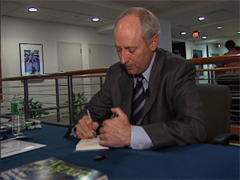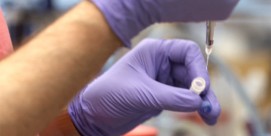In This Episode << SLIDE LEFT TO SEE ADDITIONAL SEGMENTS
Michael Sandel
Read R & E producer Susan Grandis Goldstein’s June 5, 2007 interview with Michael Sandel in Washington, DC:
Q: Why did you write THE CASE AGAINST PERFECTION?
 A: I initially became interested in the subject through my service on the President’s Council on Bioethics. One of the topics we dealt with was the question of enhancement and genetic engineering for enhancement, and I became fascinated by the topic there and began teaching a course that dealt with these issues and wrote what initially was an article in The Atlantic. Both got into this book. What intrigued me most about it was not the technology as such but the questions about the human goods, the fundamental human values and virtues that are raised by debates over biotechnology. What struck me as especially interesting was that our usual way of talking about ethics, bioethics, moral philosophy didn’t seem to capture fully what’s at stake in the debate over genetic engineering. We usually debate costs and benefits, autonomy and rights. But that moral vocabulary doesn’t really seem to capture what’s at stake in this whole question of genetic engineering and eugenics. That, I think, is really what intrigued me most: If not autonomy and rights and utility, then what? That was why it was a philosophical challenge.
A: I initially became interested in the subject through my service on the President’s Council on Bioethics. One of the topics we dealt with was the question of enhancement and genetic engineering for enhancement, and I became fascinated by the topic there and began teaching a course that dealt with these issues and wrote what initially was an article in The Atlantic. Both got into this book. What intrigued me most about it was not the technology as such but the questions about the human goods, the fundamental human values and virtues that are raised by debates over biotechnology. What struck me as especially interesting was that our usual way of talking about ethics, bioethics, moral philosophy didn’t seem to capture fully what’s at stake in the debate over genetic engineering. We usually debate costs and benefits, autonomy and rights. But that moral vocabulary doesn’t really seem to capture what’s at stake in this whole question of genetic engineering and eugenics. That, I think, is really what intrigued me most: If not autonomy and rights and utility, then what? That was why it was a philosophical challenge.
Q: What is at stake? You say these questions are almost theological.
A: Yes. Really to grapple with the ethics of enhancement requires us, I think, to confront questions that have been crowded from view in the modern world, certainly within modern philosophy. It raises fundamental questions that really do verge on theological questions: What is the proper stance of human beings toward the given world? What is the proper stance toward nature? Are there certain limits to the project of human mastery and dominion? Those are questions in moral philosophy, but they are also questions of theology and of religion.
Q: Have the teachings of faith traditions addressed these issues—whether man should aim for perfection?
A: Yes, different religious traditions give different broad perspectives on this question. Some sanctify nature as inscribed with inherent meaning. Others see the moral importance of nature as flowing from the fact of God’s creation. And there are some religious traditions that view human beings as participants in creation. This is true of the Jewish tradition, from which I come. On the one hand, human beings are empowered to exercise dominion over nature and even to be participants in creation; and yet, at the same time, there are strictures against idolatry, which is a kind of overreaching and confusing human beings’ role with God’s. So the tension between these two impulses-—to participate in creation and yet not to overreach-—that, I think, is at the crux of some of the most interesting theological aspects of this debate.
 Q: Where do you draw the line between trying to heal and trying to enhance?
Q: Where do you draw the line between trying to heal and trying to enhance?
A: I draw the line with health, with medical purposes. So I think it is one thing to try to restore normal human functioning—that would be health, that would be medicine, that would be curing or repairing. I think it’s something else to try to use biotechnology to enhance, to try to lift people above the norm, let’s say, of intelligence, or of height, or of musical ability, or to try to pick and choose the genetic traits of our children, to aim at designer children, to choose the sex of our children for purely non-medical reasons. These are really exercises in a kind of consumerist ethic that I think don’t have the same moral weight as medicine or health.
Q: But as a parent don’t you want the best for your children?
A: What I really want for my children is that they be loved and that they be happy and that they lead a good life. I suppose you could say that those goals could be captured in the idea of wanting the best for my children. But very often when we aim at the best, or what we may think is the best for our children, we aim really at lesser things, such as getting into a certain college. Never mind college, some parents expend great efforts to get their kids into the right nursery school or the right preschool, with the thought that that will set them on the path to success, to competitive success especially. So I think very often when we think we are aiming at the best for our children, what we are really doing is trying to position them for competitive success in an intensely driven kind of society. I’m not sure that always leads to the good life or to happiness.
Q: You have said maybe we should change the driven climate of the culture, and perhaps this quest for perfection really undermines the sacredness of the child-parent relationship.
A: I think part of being a parent, to love one’s child, is to accept them as they come—not to see them as instruments of our ambition or as creatures to be molded, as if they were themselves commodities. I think too often in our society parents, who may have good impulses, overreach and try to mold and shape and direct their child. That’s the phenomenon of hyper-parenting. I think people who want to use genetic technologies to gain a competitive edge for their children are engaging in a kind of overreaching that could really undermine our appreciation of children as gifts for which we should be grateful and, instead, to view them as products or instruments that are there to be molded and directed.
Q: You talk about gifts. Is that a religious argument?
A: Yes and no. It’s true that to speak of an ethic of giftedness, which is very much the ethic that I deploy in raising questions about designer children and genetic engineering—an appreciation of the giftedness of the child or the giftedness of life does have religious resonance, because a great many religious traditions emphasize the sense in which the good things in life are not all our own doing; they are gifts from God. So that is one source of an ethic of giftedness, a religious source—the idea of God as giver of gifts. But what I argue in the book is that that is one important source for the ethic of giftedness but not the only source. It’s possible to make sense of what’s morally at stake in an appreciation of the gift of life, or the gift of a child, without necessarily presupposing that there is a giver. What matters is that the gift—in this case, the child—not be wholly our own doing, our own product. So I think there is a religious source, but I want to make room for religious discourse in arguments about bioethics and also for an ethical appreciation of these ideals and values by those who may not come from a religious tradition.
One of the ways in which parenting is a learning experience and an opportunity for moral growth is that we learn as parents that we don’t choose the kind of child that we have. In most of our lives, we are accustomed to aiming at mastery and control and dominion-—over nature, over our lives, over our jobs, over our careers, over the goods that we buy. But parenthood is a school for humility. We can’t choose the precise traits of our children, and that is morally important. It teaches us what William May, a theologian whom I greatly admire, calls “an openness to the unbidden.” I think this quality, as a trait of character, as a moral disposition—an openness to the unbidden—teaches us to rein in the impulse to mastery and control that we experience in so many other parts of our lives.
Q: What technologies really concern you, like non-medical sex selection? Say a family has five girls and wants a son. What would you ban or not ban and why?
A: My emphasis in the book is not on banning or regulating. I am trying to get at the moral arguments and the ethical status of various attempts at enhancement, or genetic engineering, or the bid for designer children. But there are implications for society at large. I would include non-medical sex selection as one of those practices that I think is morally questionable and that can carry adverse social consequences. We see, in some parts of the world, that sex selection for boys—and it’s usually for boys—reflects sex discrimination against girls, and it leads to very large imbalances—in China, in Korea, in India—in the population between boys and girls, a vast disproportion of boys to girls, and it reflects really this discriminatory attitude toward girls. So that’s one social consequence. But another consequence is really to our culture, to our moral landscape. The norm of unconditional parental love, I think, depends on the fact that we don’t pick and choose the traits of our children in the way that we pick and choose the features of a car we might order, or a consumer good. If we go too far down the road of choosing the genetic traits of children, my worry is that parenting will be less a kind of school for humility than it should be, and we will become too accustomed to regarding children as instruments of our ambition and of our desires.
Q: What would a “perfect” society look like if parents did pick the traits of their children?
A: By a perfect society you mean a dystopian society?
Q: Yes.
A: I think [there are] two kinds of risks. One has to do with the life of the children who would not only feel molded and made and packaged almost as commodities by their parents, but might feel the intense pressures that go with that, because if parents are aiming at choosing children who will be good athletes, or great musicians, or who will get into Ivy League schools, or who will be tall enough to make the basketball team, then there is a danger that the life of the child will bear the burden of that expectation; and the risk of disappointment and the cost of disappointment will be even higher than they are now, and even now they can be considerable. So that’s one, the effect on the child. The other effect that I worry about is the effect on the parent, that the moral teaching of humility and of the limits to our control that parenthood teaches-—that that will be lost and that we will begin to think of children more as consumer goods than as gifts that we can’t fully control and for which we aren’t fully responsible.
Q: You see troubling comparisons with the eugenics movement.
A: I do think there is a similarity between the dark history of eugenics and present attempts to pick and choose the genetic traits of children. There is one very important difference. Traditionally, eugenics was state-sponsored and coercive. They were collectivist, and so there was the dark history of forced sterilization. The majority of American states had laws by the 1930s that allowed for forced sterilization of socially undesirable categories of people, so-called feeble-minded, for example, and with Hitler culminating in genocide. So the real question is: If you remove the coercion and you make it an individual choice, is eugenics still objectionable? I would say that it is. What we have today is a kind of privatized or free-market eugenics. It’s not an attempt to try to improve entire societies or to increase humanity’s germ plasm, as the old eugenicists said. It’s an attempt, usually by affluent parents, to give their kids an edge in a highly competitive society. But it does carry the idea, which comes from the eugenic past, that it is for this generation to pick and choose the genetic traits of the next generation.
Q: And it’s only for those who can afford it.
A: In the privatized version, it’s only for those who can afford it. So a further objection now to eugenics is that it will only deepen the gap between rich and poor, and possibly inscribe that gap in our biology. That is also a troubling prospect.
Q: Should faith communities speak out? If it is just left up to the marketplace, will that determine who can afford the technology? Should there be more discussion, and should religious groups get involved?
A: Yes, I do think this is an issue that faith groups should become involved in, because it does raise questions about the proper stance of human beings toward the given world. It involves the tension between the aspiration to human mastery, control, and dominion over nature, over children, over future generations-—the tension between mastery and dominion, on the one hand, and reverence, or respect, or restraint, or humility, on the other. And most religious traditions speak to this deep human tension between mastery and restraint, between dominion and humility. I think that’s the kind of moral vocabulary we need to make sense of the challenge posed by new genetic technologies. Unless faith communities participate in public debate about these questions, that part of the moral vocabulary will not find full expression.
Q: What is morally owed to those who suffer from disease or disability if not healing or trying to make them more perfect, healthier? Is there a higher good than relief of suffering?
A: The relief of suffering is a great good. The curing of illness and disease—these are great human goods. This is the mission of medicine. I do not argue that nature is sacrosanct in the sense that we must never tamper with nature. That would disempower, really, all of medicine. That would mean that we can’t combat dread diseases—malaria, polio, all of which are given by nature, if one thinks about it. So my argument is not that we must never intervene in nature. My argument is that there is a moral difference between intervention for the sake of health, to cure or prevent disease, and intervention for the sake of achieving a competitive edge for our kids in a consumer society. I think morally those two ambitions have a very different status. One of the differences is that aiming at health, restoring health—that is a goal that is both morally important and limited, because it aims at the restoration of normal human functioning, which is an important part of human flourishing. But aiming at giving our kids a competitive edge in a consumer society—that, in principle, is a goal that is limitless. There is no end. In fact, one can imagine a kind of hormonal arms race or genetic arms race, whether it’s to do with height or IQ, conceivably, in the future. So it’s limitless, and that’s another of the features that sets it apart from medical intervention. It really puts biotechnology in the service not only of health but of consumerism, really, and the drive for better consumer goods than one’s neighbor has, or than one had last year. This is a kind of limitless spiral, and even from the standpoint of resources I think it would be a great tragedy to devote medical resources and genetic technological breakthroughs to purposes that are not to do with health or medicine, but instead are to do with satisfying the desires that are created by the consumer society.
Q: You mentioned the Presidents Bioethics Council, and stem cell research has been a huge subject there. What needs to be done about stem cell research? What are the moral arguments?
A: In my criticism of genetic engineering for enhancement I am more in line with what my colleagues on the council thought than in my views on embryonic stem cell research. I’m a supporter of embryonic stem cell research. I do think there are very important moral and also religious questions at stake in the debate over embryonic stem cell research. The most fundamental question is: What is the moral status of the early embryo or blastocyst, which is destroyed in the course of stem cell research? And so those who view the blastocyst, the very early unimplanted embryo-—we are not, of course, talking about a fetus, but an unimplanted embryo in a lab-—there are some who believe that blastocyst has a moral status equal to that of a baby or of a fully developed human being, and if they’re right about that then embryonic stem cell research should not be permitted. I don’t think they are right about it, but in the book I try to take seriously their arguments and to address them. I think it’s important, where moral arguments do inform political views, to welcome those religious arguments into the public sphere; not to exclude them and say no, no, no, that has no place; to welcome them but also to engage with those views, to test them, to argue with them, and in some cases to learn from them. So my argument about stem cell research in the book defends it, but only after taking seriously the religious objections that people raise based on the moral status of the embryo.
Q: Defend it based on what?
A: Mainly the way I try to go about engaging with the debate about the moral status of the embryo is to try to lay out what I take to be the strongest possible arguments in favor of regarding the blastocyst as morally equivalent to a baby and then seeing whether those arguments can be sustained, whether they are adequate arguments. So I think that it’s important not to—just as faith-based arguments should not be kept out of the public arena, neither should they be exempt from critical scrutiny and rigorous philosophical argument.
Q: What is your reasoning to support the view that embryonic stem cell research is moral?
A: The main way of arguing is to see whether those who object to embryonic stem cell research on the grounds that the blastocyst is morally equivalent to a person—whether they are prepared to pursue the full moral logic of that position. And if they were, then you would not only restrict, as President Bush has, federal funding of embryonic stem cell research; you would ban all embryonic stem cell research. Right now, the Bush position is that it shouldn’t enjoy federal funding, for the most part, but it should be permitted in the private sector. If it were truly infanticide, if destroying that embryo were really morally equivalent to infanticide, you wouldn’t say we should deny federal funding to this infanticide but we should allow it to continue in the private sector. Take the example of yanking organs from babies to save other people’s lives. You wouldn’t permit that. Not only that; you would not permit fertility clinics to create and discard excess embryos if you really regarded those excess embryos as siblings of the children who were implanted and created. You wouldn’t say, well, we’ll ban embryonic stem cell research or deny it federal funding, but we’ll let fertility clinics create and discard thousands upon thousands of frozen embryos. You wouldn’t permit it, and yet many of the people who want to restrict embryonic stem cell research are not raising their voices to shut down fertility clinics that create and discard excess embryos. So it’s a test of consistency, mainly. Now some are consistent and would shut down fertility clinics that create and discard excess embryos. There is a further test for them, which is: In natural pregnancy, more than half of fertilized eggs fail to implant or are otherwise lost. Should we regard that as an instance of infant mortality? And if so, why are we not mounting ambitious public health campaigns to try to save and rescue all of the fertilized eggs that are lost in natural pregnancy? We would need a public health campaign of massive proportions if there really were over a fifty percent rate of infant mortality. And what about the religious traditions that consider those lost embryos as infant deaths? Do they mandate the same burial rites for lost embryos as for babies who die just after birth, and if not, why not? So it’s a test. And this is not to parody the religious position; it’s to take it seriously and to explore its moral logic and to see whether that moral logic is carried out fully by those who profess to hold the position in the specific case of embryonic stem cell research, but not in all of these others.
Q: Does Jewish teaching about the importance of doing everything to save a life influence your thinking on this and other bioethical topics?
A: I have a broad but not an expert or scholarly background in the Jewish tradition. I’ve tried to learn what I can from childhood, but I am not an expert on Jewish teachings in this area. It is true that the Jewish tradition emphasizes the moral mandate to save life. It also has a different position from the Catholic Church on the moral status of the embryo. It has a more developmental view of when human life, in the sense of personhood, begins than does the Catholic Church. And so that may have influenced me, but I think I’ve also been influenced by arguing through these questions with colleagues on the President’s Council on Bioethics, with students, and with others, some from religious backgrounds, others not. I do think it is very important that the religious communities do try to bring their teachings and their insights to bear on the stem cell debate and on the debate about genetic engineering.







